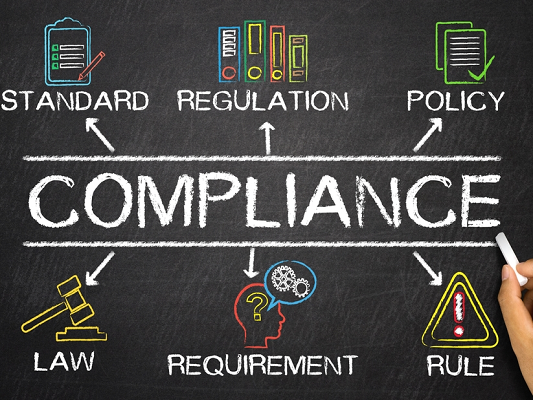 by Amy Kleinschmit, Chief Compliance Officer Cybersecurity – Year Round Task As October winds to an end, along with Cybersecurity Awareness Month, it is important to continue to remind members that they need to remain vigilant year-round and protect their personal information – just as credit unions are continually tasked with ensuring your systems remain protected from cybersecurity attacks. There are numerous resources available that credit unions that use to help educate your membership on how to be smart online and keep their information protected. This printable poster from the IRS lists basic steps people can take to protection personal and financial information, such as:
FREE Webinar: The Crossroads of Cybersecurity & Fraud Speaking of cybersecurity, there’s no better time than now to join Alloya for this jam-packed, 90-minute free webinar covering a series of cybersecurity and fraud prevention topics, hosted by two of Alloya’s risk-management experts! Part I: Protecting Your Credit Union From Cyber Threats will demonstrate how taking proactive steps to protect both your credit union and members is essential. Part II of this webinar will cover recent payment fraud trends and how to mitigate payment fraud losses at your credit union. For more information or to register for this session, click here. InfoSight – New Content Person-to-Person (P2P) Transactions - With the increased popularity of person-to-person (P2P) transactions, a new topic, Person-to-Person (P2P) Transactions, was added to the ACH/Electronic Payments channel. This topic was created to highlight and assist credit unions with the application of Regulation E; specifically, unauthorized transactions and the error resolution process the credit union must conduct. Remember - InfoSight provides immediate access to current compliance topics which explain: What is the issue (in laymen’s terms); How it affects credit unions; What credit unions need to do — the action steps needed. InfoSight also provides helpful tools, such as frequently asked questions and checklists. This is NOT just for the Compliance Officer! Compliance touches every area of the credit union and InfoSight can provide information for front line staff, HR, Loan Officer, Board & Volunteers, Executive Staff, Marketing, Collections, and more. InfoSight is provided as a FREE benefit of membership for affiliated credit unions. If you haven’t already, request your account here. IRS – 401k and IRA limits increase The IRS recently issued IR-2022-188 announced today that the amount individuals can contribute to their 401(k) plans in 2023 has increased to $22,500, up from $20,500 for 2022. Additionally, the limit on annual contributions to an IRA increased to $6,500, up from $6,000. The IRA catch‑up contribution limit for individuals aged 50 and over is not subject to an annual cost‑of‑living adjustment and remains $1,000. Be sure to review IR-2022-188 at the link above for additional information on the 2023 changes, including information on catch-up 401(k) contribution limits for employees aged 50 and over. CFPB Guidance – Junk Fees on Deposit Accounts The Consumer Financial Protection Bureau (CFPB) recently issued Guidance to Help Banks Avoid Charging Illegal Junk Fees on Deposit Accounts which can be found here. The CFPB also issued Consumer Financial Protection Circular 2022-06 that discusses whether “the assessment of overdraft fees constitute an unfair act or practice under the Consumer Financial Protection Act(CFPA), even if the entity complies with the Truth in Lending Act (TILA) and Regulation Z, and the Electronic Fund Transfer Act (EFTA) and Regulation E?” The answer is YES, per the CFPB. As discussed in more detail in the Circular, an unanticipated overdraft fee occurs when financial institutions assess overdraft fees on transactions that a consumer would not reasonably expect would give rise to such fees. This Circular highlights potentially unlawful patterns of financial institution practices regarding unanticipated overdraft fees and provides some examples of practices that might trigger liability under the CFPA. One of these examples is “authorize positive, settle negative” or APSN transactions, when financial institutions assess an overdraft fee for a debit card transaction where the consumer had sufficient available balance in their account to cover the transaction at the time the consumer initiated the transaction and the financial institution authorized it, but due to intervening authorizations, settlement of other transactions (including the ordering in which transactions are settled), or other complex processes, the financial institution determined that the consumer’s balance was insufficient at the time of settlement. The CFPB also issued Bulletin 2022-06: Unfair Returned Deposited Item Fee Assessment Practices, which can be found here. This Bulletin discusses Returned Deposited Items - checks that a consumer deposits into their checking account returned to the consumer because the check could not be processed against the check originator’s account. The CPFB finds that blanket policies of charging Returned Deposited Item fees to consumers for all returned transactions irrespective of the circumstances or patterns of behavior on the account are likely unfair under the Consumer Financial Protection Act (CFPA). Per the CFPB, “In many of the instances in which Returned Deposited Item fees are charged, consumers would not be able to reasonably avoid the substantial monetary injury imposed by the fees. An injury is not reasonably avoidable unless consumers are fully informed of the risk and have practical means to avoid it.” As always, DakCU members may contact Amy Kleinschmit with any compliance related questions. Comments are closed.
|
The MemoThe Memo is DakCU's newsletter that keeps Want the Memo delivered straight to your inbox?
Archives
July 2024
Categories
All
|
|
Copyright Dakota Credit Union Association. All Rights Reserved.
2005 N Kavaney Dr - Suite 201 | Bismarck, North Dakota 58501 Phone: 800-279-6328 | [email protected] | sitemap | privacy policy |





